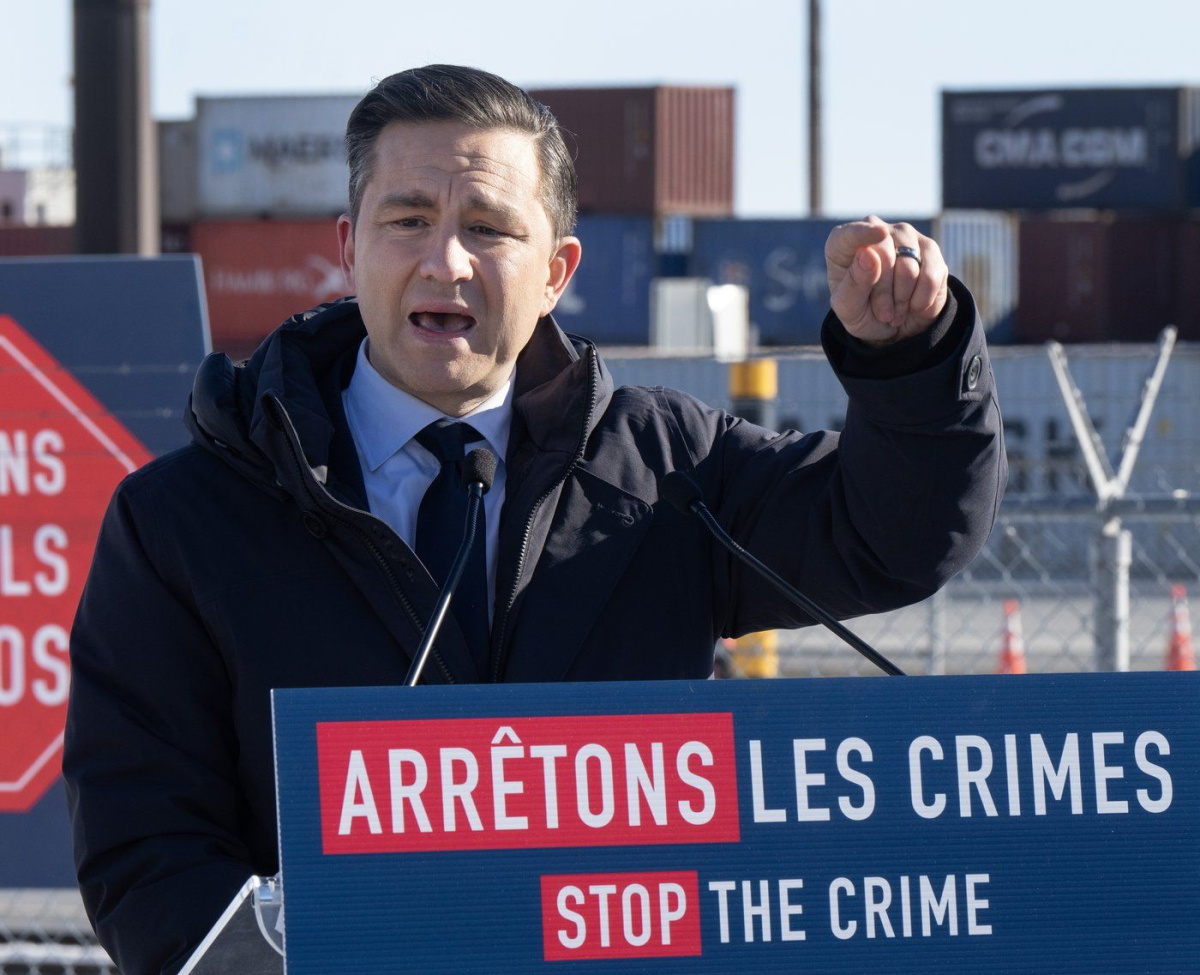Support strong Canadian climate journalism for 2025
As Pierre Poilievre blames a rise in car thefts on Prime Minister Justin Trudeau, Liberal ministers spent Tuesday pushing back — and promised that an upcoming summit will result in solutions.
Federal officials will meet industry executives, police and members of Canada Border Services Agency in Ottawa on Thursday to develop a plan for tackling an alarming spike in auto thefts.
After a bruising year marked by major slumps in public opinion polls, the federal government announced the summit last month, as members of Trudeau's cabinet huddled to discuss strategy in Montreal.
The Port of Montreal is where Poilievre chose to deliver a sales pitch Tuesday for his party's proposed new measures.
It marked the Conservative leader's second straight day announcing his own solutions to car theft in a city where police say it's a worsening problem — and tying crime directly to cost-of-living concerns.
"After eight years, Justin Trudeau is not worth the cost," Poilievre told reporters.
"After eight years, Justin Trudeau is not worth the crime. After eight years Justin Trudeau is not worth the cost of crime."
The stealing and shipping of vehicles overseas by organized crime rings has been an escalating problem across the country's largest cities and suburbs, regions where the Tories have found themselves shut out over the past few elections.
In Quebec, police reported auto thefts rose by 50 per cent in 2022, as did officials in Ontario. That year, 9,600 vehicles were stolen in Toronto, 300 per cent more than in 2015, when Trudeau first came to power.
Pointing the finger at Trudeau, Poilievre promised Tuesday that if Conservatives form the next government, he would spend millions toward new scanners so border agents can better detect stolen cars in shipping containers.
On Monday in Brampton, Ont., a Greater Toronto Area city that is also grappling with soaring theft numbers, he vowed to impose tougher measures against car thieves.
The pre-emptive political strike in the lead-up to the Liberal summit is set to continue with another press conference in Ottawa on Wednesday.
While Poilievre's announcements have first been delivered via slick social-media campaigns, he's putting himself in front of mainstream reporters more often than ever.
It's an apparent change of tactic for a leader whose critics have accused him of offering few policy solutions while circumventing — and railing against — traditional media, at a time when the party is thinking of the next election.
Liberals tried to steer the narrative in another direction Tuesday.
Public Safety Minister Dominic LeBlanc took issue with Poilievre blaming the federal government for the rise in auto thefts.
"The idea that the federal government alone can attack something as complex as organized crime auto theft in big and small communities across the country is very disingenuous," he said before the House of Commons question period on Tuesday.
"This is a complex problem."
He said more investments are coming for the RCMP and border services to tackle the problem.
Treasury Board President Anita Anand told the House much of the same Tuesday, telling the Opposition Conservatives that "slogans and videos are not going to fix this very complex problem."
Anand went on to say that the Tories only started hammering on the issue once the Liberals promised they would do something about it.
The Liberals frequently attack Poilievre's Conservatives for peddling simplistic solutions to complex problems, such as suggesting that eliminating carbon pricing would help address food inflation and housing affordability.
At the same time, however, they have also acknowledged that his relentless focus on the cost of living — and his attacks on the carbon price in particular — has been gaining traction with Canadians.
Carlene Variyan, associate vice-president at Summa Strategies and a former senior staffer in several Liberal ministers' offices, suggested the government wouldn't make the efforts to organize such a summit "without planning to have something to show for it."
"They need to demonstrate some form of forward progress," Variyan, who worked for a public safety minister, said in an interview Tuesday.
"People want to know things like, 'What can auto manufacturers do to make my car less susceptible to being stolen?' They want to know, 'What can my local police force do to help me?'"
Variyan said the summit offers the government a chance to reassure Canadians they're working to solve a problem that resonates in their everyday lives and that MPs in cities such as Toronto and Montreal have been hearing about.
Earlier on Tuesday, Transport Minister Pablo Rodriguez said ministers were heading into Thursday's summit armed with ideas, and that Canadians will "absolutely" see measures announced afterward.
Justice Minister Arif Virani said he understands Canadians' anxieties when it comes to crime, and that as a Toronto MP, he shares those concerns.
But he pushed back against proposals Poilievre announced Tuesday to punish car thieves more harshly, saying such tools already exist in the Criminal Code.
Poilievre promised a "new specific aggravating factor when the offence of motor vehicle theft is committed for the benefit of organized crime."
But the Criminal Code already says a judge can reduce or increase a sentence based on a list of factors, including whether "the offence was committed for the benefit of, at the direction of or in association with a criminal organization," Virani said.
"We need to look at many different instruments and tools to address the pressing situation. What is being suggested by Pierre Poilievre already exists in the Criminal Code."
Poilievre's office did not immediately respond to a request for comment Tuesday.
The NDP's public safety critic, Peter Julian, said in a statement that both Conservative and Liberal governments have failed to address the growing issue.
This report by The Canadian Press was first published Feb. 6, 2024.
With files from Mia Rabson in Ottawa.




Comments